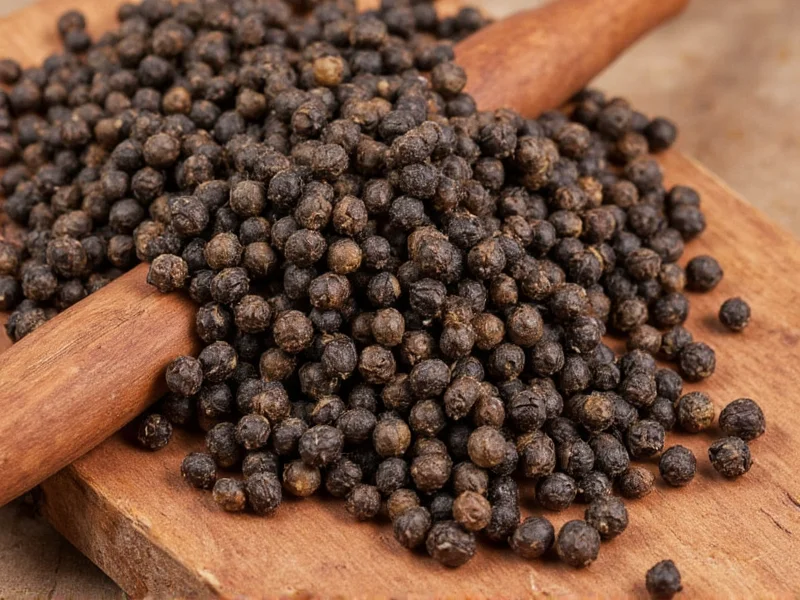The Origins and History of Black Pepper
Black pepper has been used for thousands of years, with evidence of its use dating back to ancient Egypt where it was placed in burial chambers. In medieval Europe, black pepper was so valuable it was often used as currency, earning the nickname “black gold.” The spice trade routes established primarily for black pepper significantly influenced global exploration and commerce. Native to the Malabar Coast of India, Piper nigrum thrives in tropical climates with consistent rainfall and shade.
How Black Pepper Is Processed
The transformation from berry to spice involves several precise steps:
| Stage | Process | Result |
|---|---|---|
| Harvesting | Berries picked when green and unripe | Full flavor development potential |
| Boiling | Immersion in hot water | Cleans berries and prepares for drying |
| Sun-drying | Spread on mats for 3-7 days | Berries shrivel and turn black |
| Sorting | Removal of imperfect peppercorns | Consistent quality product |
This traditional sun-drying method causes enzymatic reactions that develop black pepper's distinctive flavor profile, which differs significantly from white pepper (made from ripe berries with outer layer removed) or green pepper (unripe berries preserved).
Nutritional Profile and Health Benefits
Black pepper isn't just a flavor enhancer—it offers several science-backed health advantages. A single tablespoon (6g) contains:
- 11 calories
- 0.3g fat
- 2.5g carbohydrates
- 0.7g protein
- Significant amounts of manganese, iron, and potassium
The active compound piperine (making up 4-9% of black pepper) enhances nutrient absorption, particularly curcumin from turmeric, by up to 2,000%. Research indicates black pepper may:
- Improve digestion by stimulating digestive enzyme production
- Provide antioxidant protection against cellular damage
- Support cognitive function and potentially reduce risk of neurodegenerative diseases
- Aid in nutrient absorption, especially fat-soluble compounds
Culinary Applications and Pairing Suggestions
Chefs worldwide value black pepper for its versatility. Unlike pre-ground versions, freshly cracked black pepper delivers superior flavor due to volatile oil retention. When exploring how to use black pepper in cooking, consider these applications:
- Add whole peppercorns to soups, stews, and pickling liquids for subtle flavor infusion
- Crack fresh pepper over finished dishes like eggs, roasted vegetables, or grilled meats
- Use in spice rubs for proteins, combining with complementary spices like coriander or cumin
- Enhance sweet applications like chocolate desserts or fruit salads in small quantities
The difference between black pepper and white pepper extends beyond color—black pepper offers more complex, floral notes with moderate heat, while white pepper delivers sharper, more direct pungency preferred in light-colored sauces where black specks would be undesirable.
Storage Techniques for Maximum Freshness
To preserve black pepper's volatile oils and pungency, proper storage is essential. Whole peppercorns maintain freshness for 2-3 years when stored in airtight containers away from light and moisture. Ground pepper loses potency within 4-6 months. For optimal flavor retention:
- Store in opaque, airtight containers
- Keep away from heat sources like stoves
- Grind only what you'll use immediately
- Avoid refrigeration which introduces moisture
Global Production and Economic Impact
Today, Vietnam leads global black pepper production (accounting for approximately 34% of worldwide supply), followed by Brazil, Indonesia, and India. The international black pepper market exceeds $2 billion annually, with demand driven by both culinary applications and growing interest in its health benefits of black pepper. Sustainable farming practices are increasingly important as climate change affects traditional growing regions.
Frequently Asked Questions
What gives black pepper its spicy heat?
Piperine is the alkaloid compound responsible for black pepper's characteristic pungency. Unlike capsaicin in chili peppers which affects heat receptors, piperine creates a different sensation often described as sharp or penetrating rather than burning. The concentration of piperine varies by pepper variety and growing conditions, typically ranging from 4-9% in dried peppercorns.
Can black pepper improve nutrient absorption?
Yes, research shows piperine in black pepper significantly enhances the bioavailability of certain nutrients and compounds. Most notably, it increases curcumin absorption from turmeric by up to 2,000%. It also improves absorption of selenium, beta-carotene, and certain B vitamins. This property makes black pepper valuable in dietary contexts where maximizing nutrient uptake is important.
Why is freshly ground black pepper superior to pre-ground?
Freshly ground black pepper retains volatile essential oils that evaporate quickly after grinding. These oils contain the compounds responsible for black pepper's complex flavor profile beyond simple heat. Pre-ground pepper loses up to 90% of these volatile compounds within an hour of grinding, resulting in diminished flavor complexity and intensity. For optimal culinary results, always grind pepper immediately before use.
Is black pepper safe for daily consumption?
Yes, black pepper is generally safe for daily consumption in culinary amounts (typically 1-2 grams or about 1/4 to 1/2 teaspoon). However, extremely high doses (more than 20-30 grams daily) may cause gastrointestinal irritation in sensitive individuals. People taking certain medications like blood thinners or antidepressants should consult their healthcare provider about potential interactions with piperine.











 浙公网安备
33010002000092号
浙公网安备
33010002000092号 浙B2-20120091-4
浙B2-20120091-4